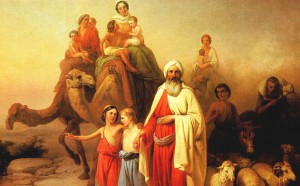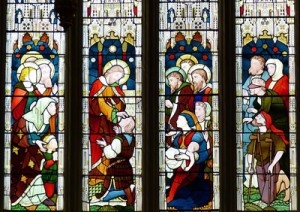Our Lord Jesus was so in love with his undertaking that he would not go out free from it, and therefore engaged to persevere for ever in it; and for this reason he is able to save us to the uttermost. . . ….
—Matthew Henry on Psalm 40 (c. 1708)
The Battle of Siddim
 Four kings and four armies came out of Mesopotamia, the land between the rivers. They descended on Canaan and overthrew the king of Sodom and his allies. Then, having secured captives and spoil, they turned back toward the north and east (Gen. 14).
Four kings and four armies came out of Mesopotamia, the land between the rivers. They descended on Canaan and overthrew the king of Sodom and his allies. Then, having secured captives and spoil, they turned back toward the north and east (Gen. 14).
One man escaped the battle and came to Abram’s encampment. The headlines in the man’s story were scarcely relevant to Abram, but one detail was of immense importance … the invading kings had taken his nephew Lot. Abram sent word to the local sheiks who were his confederates, and they willingly agreed to join him in a high drama rescue operation. Then Abram armed “his trained servants, born in his own house,” 318 men, and set out after the Mesopotamian kings.
Abram caught up with them near the northern boundaries of the Promised Land. There he divided his forces and attacked during the night. The Mesopotamian armies fled, but Abram and his men pursued them to Damascus and beyond. In the end, Abram recovered everything and everyone … including Lot.
Now, note the words “trained servants, born in his own house” (vs. 14). These 318 servants were trusted members of Abram’s sheikdom. They were part of his extended family. He had trained them to use weapons effectively and to operate as an effective strike force against a more powerful enemy. When he led them into battle, he didn’t hesitate to spin one group or more off from the rest for the sake of tactical advantage. He trusted them all. Yet they were servants, his “home-born” slaves.
Eliezer of Damascus
Once the Battle of Siddim was safely over, Abram had time to consider the possible repercussions of his military actions. After some time the kings might return. Next time … they would be prepared. His careful tactics might not be enough to bring down four kings with their armies the second time. What, then, would become of his mission? What would become of the promise of the Seed, the Messiah?
Before Abram could turn to God with his concerns, God spoke to him in the privacy of his tent: “Fear not, Abram. I am thy shield and thy exceeding great reward” (Gen. 15:1). God would protect Abram. His fears were unnecessary. But now that Abram had God’s ear, as it were, he brought forward his chief concern. He had no son. God had promised him one, but Abram was still waiting.
And so Abram said, “Lord GOD, what wilt thou give me, seeing I go childless, and the steward of my house is this Eliezer of Damascus? Behold, to me thou hast given no seed and, lo, one born in my house is mine heir” (vv. 2-3).
There it is again: “one born in my house.” Yet this Eliezer was Abram’s steward, a position of considerable responsibility and power … especially given the size of Abram’s sheikdom. And in the absence of son, he was also Abram’s heir.
We meet Eliezer again in chapter 24. There he is described as Abram’s “eldest servant… that ruled over all that he had.” Abram sends him to Haran in Syria to find a wife for Isaac, Abram’s son. Eliezer goes with a great deal of wealth and the full authority to negotiate in his master’s stead. Abram’s kindred in Haran receive him with respect and courtesy and address him as, “My lord,” and, “Thou blessed of the LORD” (24:18, 31). In the end, they entrust Rebekah to his care and send her off to be Isaac’s wife.
Yet Eliezer says plainly, “I am Abraham’s servant” (v. 34). Eliezer was a home-born slave.
The Home-Born Slave
Though the role of home-born slave is remarkably ancient, the first legal description we have of it appears in the Book of the Covenant (Ex. 21-23), the God-given supplement to the Ten Commandments. Since God had just freed Israel from Egyptian bondage, He began this supplementary legislation with laws governing slavery.
One of the situations the Book of the Covenant posits is this: An Israelite becomes an indentured servant, probably because he was unable to pay his debts. Such an indenture could last no more than six years … every Sabbath year all debts and indentures were to be cancelled (Ex. 21:1-6; cf. Deut. 15:12-18).
But it might be that such a servant would want to stay with his master. In such a case, the servant might apply to become a home-born slave. The master would bring his servant to the judges so they could be certain that no coercion was involved. Then the master would lead his servant to his house, place his ear against the door or doorpost, and bore it through with an awl. In this way the servant was “born” or adopted into his master’s house. He would wear a golden earring the rest of his life to testify that his ear was bound to his master’s voice and that no threats or coercion would ever be necessary to move him to obedience. The ear of the home-born slave was said to be “circumcised.” And such a slave would be a member of his master’s house indefinitely.
The Servant of God
 The prophets spoke of Messiah as the Servant of God. The prophecies of Isaiah develop this theme at length. But Psalm 40 actually invokes the imagery of the home-born slave. The Messiah, who is speaking in this Psalm, says, “Sacrifice and offering thou didst not desire; mine ears thou hast opened: burnt offering and sin offering hast thou not required” (v. 6).
The prophets spoke of Messiah as the Servant of God. The prophecies of Isaiah develop this theme at length. But Psalm 40 actually invokes the imagery of the home-born slave. The Messiah, who is speaking in this Psalm, says, “Sacrifice and offering thou didst not desire; mine ears thou hast opened: burnt offering and sin offering hast thou not required” (v. 6).
In this psalm “Messiah” testifies that the peace offerings, tribute offerings, whole burnt offerings, and sin offerings prescribed in the Mosaic Law were not at all what God’s justice and grace required. The blood of bulls and goats could never take away sin (Heb. 10:4). And so we hear “Lo, I come . . . I delight to do thy will, O my God” (vv. 7-8). The Messiah commits Himself to doing what God actually requires … coming in the flesh to atone for sin.
The Book of Hebrews repeats these verses from Psalm 40, but with one significant change. In place of “mine ears thou hast opened,” Hebrews has, “a body hast thou prepared me” (Heb. 10:5). That is, the two phrases are equivalent. The Son in His incarnation took upon Himself “the form of a servant, and was made in the likeness of men.”
And being found in fashion as a man, he humbled himself, and became obedient unto death, even the death of the cross (Phil. 2:6-7).
Jesus Christ in His humiliation was, in effect, the home-born slave, the suffering servant, of Yahweh. His ear was open (circumcised) to do all the Father’s will, even to His atoning death on the cross. But the same Jesus who died for sinners … God the Father exalted to His own right hand as Lord of heaven and earth:
Wherefore God also hath highly exalted him, and given him a name which is above every name: that at the name of Jesus every knee should bow, of things in heaven, and things in earth, and things under the earth; and that every tongue should confess that Jesus Christ is Lord, to the glory of God the Father (Phil. 2:9-11).
Conclusion
The role of home-born slave finds its fulfillment in Jesus Christ. We don’t need any more bloodied ears or golden earrings or the kind of commitment that went with them. The New Testament urges freedom and personal responsibility, though it allows for full adoption into a believing family. Like the rest of Scripture, it also recognizes that some men do best working for others. We have to face reality here … not everyone has to be an entrepreneur or independent businessman. Some people find the proper niche for the gifts and talents within some larger business or service organization. But wherever God’s people work, they are to work diligently and faithfully as unto the Lord, just like the home-born slave (Col 3:23).

Add Comment